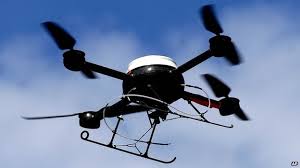‘Flying 3D printer’ could play key role in emergencies
Kusoro Jeremiah with agency report
Engineers from Imperial College London have built autonomous “flying 3D printer” drones, which could protect people from nuclear waste.
The drones can “print” a sticky foam on dangerous objects before attaching themselves and lifting the hazard away.
The engineers hope that the drones will one day be capable of printing nests in treetops to enable them to rest and recharge before continuing.
But one roboticist is unconvinced about the device’s 3D-printing capabilities.
Dr Mirko Kovac, director of the aerial robotics laboratory at Imperial College London, has been working on the project with a small team.
Bridging gaps:
In a video demonstration, a quadcopter (a drone with four rotors) can be seen printing a sticky foam substance onto a small block, before flying away.
A hexacopter (which has six rotors) then takes the quadcopter’s place, landing on the sprayed object and waiting for the foam to set.
Then the hexacopter flies off, with the foreign object attached to its underbelly.
The researchers hope this process will be particularly useful for removing hazardous materials, such as nuclear waste.
According to the New Scientist, the quadcopter acts almost entirely autonomously and is guided by GPS.
The foam is said to be made of polyurethane. The project’s abstract states that potential applications could include “ad-hoc construction of first response structures in search-and-rescue scenarios,” as well as “printing structures to bridge gaps in discontinuous terrain”.
Thomas J Creedy, a PhD student working on the project at Imperial College London, said in a statement:
“This is an exciting first step in the
lab’s development of co-operative robotic systems for building structures inspired by the natural world.”
Future potential:
The robots are said to be inspired by swiftlets – birds that construct nests using their saliva.
Noel Sharkey, Emeritus Professor of Artificial Intelligence and Robotics at the University of Sheffield, told the BBC he was not impressed with the 3D-printing capabilities but had high hopes for its future potential.
Having seen the video presentation, Prof Sharkey said: “This could hardly be called 3D printing, although it uses some of the components.
“However, the potential game changer in this application is their notion of using it to repair bridges and other construction works from the air.”
On 24 June, 3D printing firm Deezmaker and aerial photography company Velocity Pigeon teamed up to create a less advanced flying 3D printer, which they claimed was a ” world first”.
Dr Kovac’s drones will be demonstrated at the Imperial Festival in London on 9 and 10 May.


